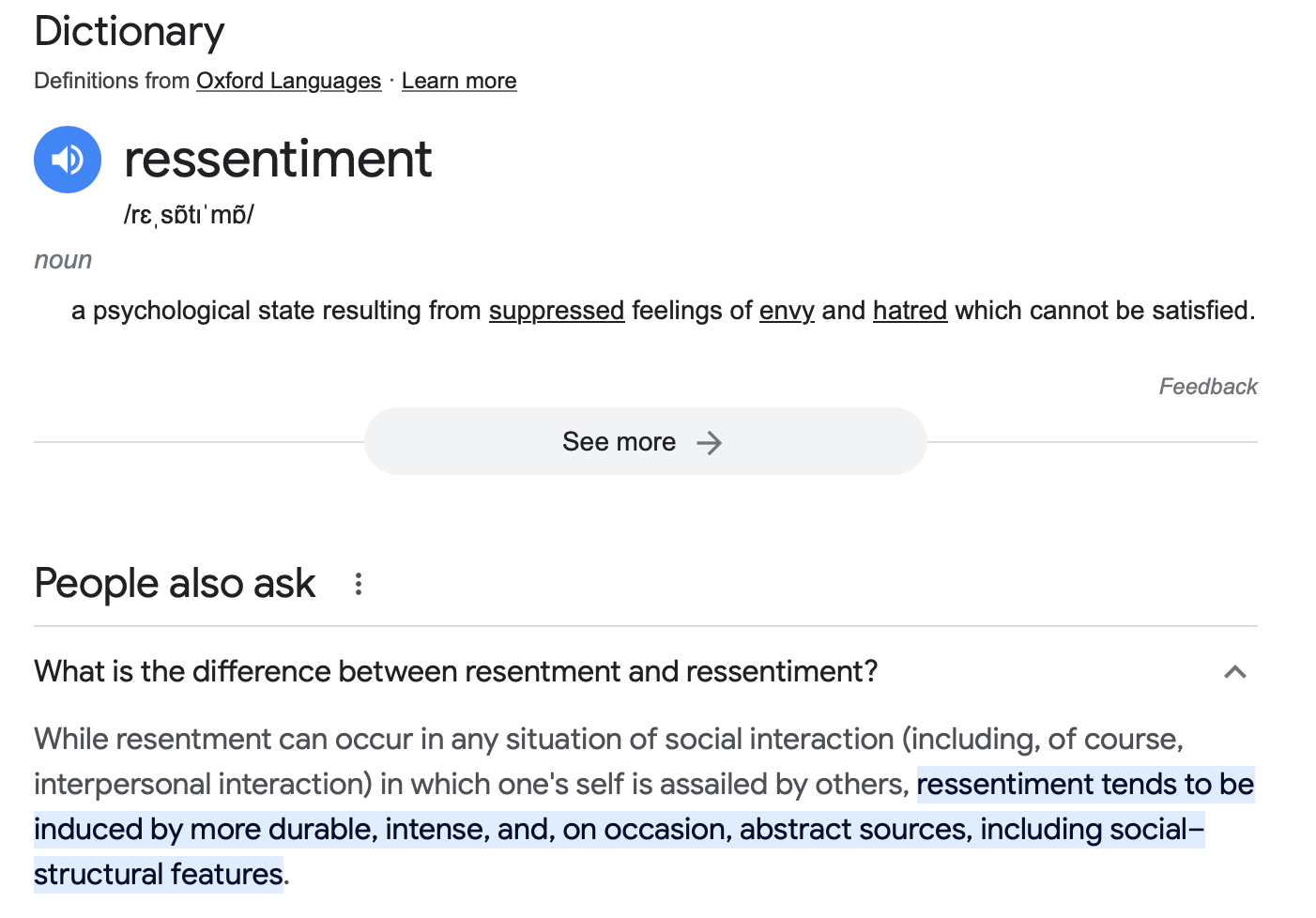Ressentiment as gas attack
'opening salvo' in a Christmas invitation to consider something that's poisoning our collective communicative environment
Hello all,
thank you for your patience with me, and ‘welcome back’ (if you are, indeed, still here [if, indeed, you ever were…]). In the following few posts, I’m intending to pick up where I left off in early October, using humdog, Baudrillard, and Antony’s remix of OPN to start thinking about what’s happening online. It might be good to start with that post, if you like.
There’s a big boomerang or three in operation here, in my mind; this will return directly to Baudrillard, and to the global circulations of containerised shipping and its infrastructures and shadows; it will also return, homologously, to think about the control infrastructures of contemporary Internetz1 and their shadows; and it will return, at some point, Returnal, to dwell on everyday life and lived experience, as I was trying to do using Gorz 9-12 months ago. But first, here, a kind of overture on ressentiment.
I’d initially hoped to capture this in one post. As usual, the words proliferated, so I’ve tried to start with the first frame, beginning with the following three quotes, then giving no more than a few opening impression of the smell and danger of ressentiment as it wafts toward us all now.
Most understanding is usually a misunderstanding that has no understanding of the mis-
– Niklas Luhmann
language in cyberspace is a frozen landscape.
– humdog
In Buddhist literature there is a metaphor commonly used to describe this whole process, the creation and development of ego. It speaks of a monkey locked in an empty house, a house with five windows representing the five senses. This monkey is inquisitive, poking its head out of each window and jumping up and down, up and down, restlessly. He is a captive monkey in an empty house. It is a solid house, rather than the jungle in which the monkey leaped and swung, rather than the trees in which he could hear the wind moving and the rustling of the leaves and branches. All these things have become completely solidified. In fact, the jungle itself has become his solid house, his prison. Instead of perching in a tree, this inquisitive monkey has been walled in by a solid world, as if a flowing thing, a dramatic and beautiful waterfall, had suddenly been frozen. This frozen house, made of frozen colors and energies, is completely still. This seems to be the point where time begins as past, future, and present. The flux of things becomes solid tangible time, a solid idea of time.
The inquisitive monkey awakens from his blackout, but he does not awaken completely. He awakens to find himself trapped inside of a solid, claustrophobic house with just five windows. He becomes bored, as though captured in a zoo behind iron bars, and he tries to explore the bars by climbing up and down. That he has been captured is not particularly important; but the idea of capture is magnified a thousand times because of his fascination with it. If one is fascinated, the sense of claustrophobia becomes more and more vivid, more and more acute, because one begins to explore one’s imprisonment. In fact fascination is part of the reason he remains imprisoned. He is captured by his fascination. Of course at the beginning there was the sudden blackout which confirmed his belief in a solid world. But now having taken solidity for granted, he is trapped by his involvement with it.
– Chögyam Trungpa
~
Earlier this year, I had a powerful vicarious experience of ressentiment, a ‘very 2023 tainted’ taste of 2023. It included aftershocks with aftertastes.
As a kind of poisonous affective gas that can diffuse across psyches through digital platforms, ressentiment can now permeate and poison a whole community – at the speed of 5G and fibre optics. Increasingly, it tends to do so. Increasingly, I realise how much it is contaminating and ruining the very possibility of living well together, somehow. It also seems to cross cultures and classes, permeating left and right, here and there. As Kraftwerk said of radioactivity: it’s in the air/for you and me.
The permeation of our voiced lives by ressentiment is a danger that exists within and between all of us; I think it’s becoming ever more prevalent in how we express identities in groups and politics online (and we cannot even express ourselves when we’re coughing and choking on it); for me, this places ressentiment among the ‘dangerous dangers’2 of the political present. Ressentiment may be especially dangerous now because it corrosively erodes not only small talk and good cheer on online message boards, but also democracy, and even the very possibility of building solidarities toward effective collective action on the fundamental issues of ecology and geopolitics we must face together or be destroyed by as individuals.
Ressentiment in the present functions in communication analogously to the way gas warfare functioned at Ypres and after: it deprives the whole environment of its ability to sustain life. Ressentiment matters collectively – because it is an attack on the communicative environment as a whole. Like chlorine and mustard, it replaces the very ‘air’ that sustains our sociable humanity with something that induces burning eyes, vomiting, sickening dizziness, communicative asphyxiation.
As in gas warfare, usually its attackers knew this would transpire, so they attacked while wearing a mask, in multiple senses. The attacker remains faceless and nameless; in many contexts they are perversely ‘allowed’ to remain anonymous, and this might even be a sign of virtue or heroism: Q is a case in point. Like the later asymmetrical tactics of aerial bombardment and drone strikes, usually the attackers pre-emptively place themselves beyond reciprocal reach and recognition, in canny ways that implicitly indicate that no one actually thinks it’s fair or right that they be treated in this way3. Only Others deserve the punitive inflictions demanded by ressentiment – and they fully deserve it, boundlesslesly, indefinitely, gleefully4.
I think we live in a political present in which communication – positive, empathic, good faith communication tout court– is endangered by a petty-planetary politics of ressentiment. There is a danger to the whole of digitally-mediated communication here (in a world where more and more and nearly all communication is digitally mediated) we already intuit but haven’t fully seen for what it is and reckoned with. In one sense, ressentiment is the stinky enactment of planetary pettiness, petty beef at global scale, small wrongs simmering in the handheld hostility of all against all, shit slinging writ total. Surveillance capitalism can feed on this data exhaust, but neither good faith nor empathy can survive it, after a point. We have been brought low by some very petty shit; low numbers doing high collateral damage, doing a number on all of us. The tragicomic fate of humanity rendered useless by base and baseless attacks of the lowest kind.
Ressentiment thus truly matters to all of us now, regardless of how online we are for it is not only antisocial at a 1:1 or small group level, and doesn’t ‘stay’ online. It is as potently effective at destroying the possibility of good enough sociability within and between face-to-face communities as methane and CFCs are potent wreckers of the ozone layer. At all scales, in all relations, including offline and person-to-person, ressentiment turns the ‘…somehow’ of this blog’s title into a ‘– not a fucking chance, no way.’ In one sense, if we don’t address how ressentiment is poisoning all of societal life now, we are totally hosed.
This is because, in poisoning the environment of communication with a very lingering toxin (and ressentiment is a very lingering toxin, it has the half life of cultural memorycarried across the falsely concrete narratives of imagined and hallucinated communities). Ressentiment’s lingering poisoning precludes us ever being able to work together, put aside differences, resonate in sympathy – let alone build solidarity based on an acknowledgement of shared vulnerability in this, our accelerated, debounded community of fate.
And yet: have I not asserted that it matters so much without first laying out what ressentiment is? What does this slippery word, which is hard enough just to pronounce in English, really mean?
Ressentiment is more than just resentment; it is more durable than a passing feeling, although it is driven by feelings and produces systemic affects.
Ressentiment is a structure of feeling – that enduringly poisons any possibility of living well together.
Ressentiment lingers, long after it has evacuated itself and left the environment of communication bare of good faith, sincerity, empathy and hope.
In the contexts acutely at issue in most of our lives now, ressentiment is visible and culturally notable in the corrosive, erosive animus that courses through the veins of the naysayer, the shitposter, the negativist, the reactionary swing voter who will vote with the fascists to ‘teach Them a lesson’. Ressentiment powers the demiurge of the sneering troll, the unempathic relentless agitator, the smarmy propagator of the lol, the relentlessly vindictive dealer of asymmetrical punishments: it pumps and powers the hater, the death-threater, the doxer. Ressentiment is the badly digested material of the world that remains in the guts of they who have gorged themselves on it, poisoning their bloodstream, making them chronically shitty at everyone. This is why we should insist on a faecal metaphorics aptly condensed by the emoji below, and this is also what gives ressentiment the stench of the seeping farts of every constipated cohabitor of the online pseudocommunity without qualities5. Ressentiment is the infliction of one’s own poisonous old shit on a concrete set of objects held to be to blame for this –‘look what you made me do to you’. Ressentiment is always enacted if it were the total caused fault of concrete Others who must be named, denounced, pursued, punished, and exterminated by it. It is among us; it is inside you.
~
The steps of what will follow in the coming few weeks will be roughly as follows.
Next, I’ll give a the concrete example of ressentiment I experienced this year.
Having given this sketchy portrait, I’ll give a post to walking through its conceptual evolution to Max Scheler, and contrast it a little with Adorno’s ideas of manipulative agitation of regressed-reified subjects, and Franz Neumann’s alternative model of manipulative anxiety and false concreteness.
Finally, I’ll work with Joseph Vogl’s invaluable conception, which I strongly urge you to read carefully, and try to sketch with as compact clarity as I can muster what it means, how it works, and why it matters.
I may switch to using Internetz from now on, not only in homage to lolcatz, but also because the internets are plural and culturally-imperially formed: contemporary Chinese internet (of which I know very little) is importantly distinct to the Anglocapitalist, US/FAANG-dominated internet (which is different again to the Russosphere’s Internet). In English we tend not to name the particularity and peculiarity of ‘our’ internet and its distinct cultures and problems; nor do we provincialise it. On the contrary, as a weird hangover from the 90s-00s, it is still regarded as a sine qua non for ‘the global’ and globalisation.
from Foucault, paraphrasing: the point is not that everything is bad, but that everything is dangerous. The task therefore is to apprehend which is the ‘dangerous danger’.
I’m drawing a line from Rawls here, by way of reciprocity and the exchangeability of positions: one should only deal out the minimum that one would accept for oneself and one’s own, given that one could be allotted to the position in which that would be one’s dealt hand.
There is something about this (2010s) overused adjective/adverb that *does* capture something, still. Overused, but not yet played out.
Building on Musil and Vogl. From Musil’s The Man without Qualities (Derr Mann ohne Eigenschaften), we have the first section, which the Muir’s translated beautifully as ‘Pseudoreality Prevails’. In the contemporary period, we have the formation of digital enclaves where group identities cohere around the sharing building of particular ressentiments (that group shares a presentment of the causes and blameworthy victim-objects of its ressentiment), leading to a kind of ‘volksgemeinschaft’ which is also ‘ohne eigenschaften’ which is also corrosive to the Gesellschaft. Please excuse my un-conjugated and no doubt slightly butchered German.






